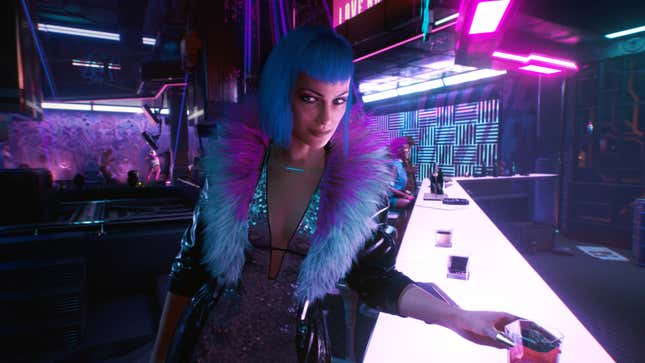
It’s clear by now that Cyberpunk 2077 is a bit of a disaster, especially on consoles. During a recent conference call with CD Projekt Group’s management board, executives said they knew the game was busted before its December 10 launch.
CD Projekt president and co-CEO Adam Kiciński opened a presentation to investors yesterday with comments about the giant, cybernetic elephant in the room: Cyberpunk 2077’s performance on consoles.
The game launched “way below […] expectations,” Kiciński explained, going on to say that management had “ignored the signals” that more time was needed to make sure Cyberpunk 2077 was ready for the base PlayStation 4 and Xbox One platforms.
“It was the wrong approach and against our business philosophy,” Kiciński said. “On top of that, during the campaign, we showed the game mostly on PCs.”
“We definitely did not spend enough time looking at [PlayStation 4 and Xbox One performance],” vice president Michał Nowakowski added later in the call.
When asked why Cyberpunk 2077 wasn’t shown running on PlayStation 4 and Xbox One before release, billionaire co-CEO Marcin Iwiński explained that they kept the console version from the public eye due to working on the game right up to release.
“The reason [we didn’t show the game on PlayStation 4 and Xbox One] is that we were updating the game on last-gen consoles until the very last minute, and we thought we’d make it in time,” Iwiński said. “Unfortunately, this resulted in giving it to reviewers just one day before the release, which was definitely too late and the media didn’t get the chance to review it properly. That was not intended; we were just fixing the game until the very last moment.”
I don’t buy the picture these executives are painting here. Last year, lead quest designer Paweł Sasko told Eurogamer that CD Projekt had every version of Cyberpunk 2077 running “at all times” in order to keep an eye on parity across platforms. They had to have some inkling that performance on PlayStation 4 and Xbox One wasn’t living up to expectations, an assumption that’s backed up by the studio’s attempts to keep those versions from public scrutiny as long as possible. You don’t dick around with console footage and review codes, as CD Projekt did right up until launch, unless you know your game is broken.
Looking back, it becomes obvious that this atmosphere of obfuscation around how Cyberpunk 2077 performed on PlayStation 4 and Xbox One was baked into the marketing. As Iwiński noted, the only console footage they showed was of the game running on souped up last-gen platforms like PlayStation 4 Pro and Xbox One X or through the backwards compatibility of PlayStation 5 and Xbox Series X. But in comparing the limited footage CD Projekt released to the analysis of outlets like Digital Foundry, which shows constant framerate drops no matter which last-gen console is being used, even that is suspect.
Speaking to Wccftech in July 2019, UI coordinator Alvin Liu talked up Cyberpunk 2077’s graphics on less-powerful platforms.
“We’re targeting consoles as first-class platforms and it looks amazing there,” Liu said. So obviously, if you spent, you know, $2,000 building your PC rig, it’s going to look better on that. But the graphics are quite amazing for what you’re going to get from Cyberpunk 2077 on consoles and low-end PCs.”
Liu was, of course, not part of the marketing team, and Cyberpunk 2077 was still over a year away from release when he made these statements. It’s entirely possible that developers on the ground believed that the game would be ready for consoles at launch and weren’t intending to be misleading. That said, it’s much harder to give the same leeway to statements made by corporate management in the months directly preceding the December 10 release.
After Cyberpunk 2077 was delayed for a second time, CD Projekt vice president Michał Nowakowski downplayed concerns about the game’s performance on last-gen consoles during an October call with investors.
“[T]here’s nothing wrong with Xbox or PS4 versions – there is optimization to be handled, also because of how we were approaching things from the get-go in terms of development; so – there is no problem with Xbox or PlayStation 4, to be honest,” Nowakowski said.
CD Projekt executives even kept this façade up during the company’s most recent financial presentation on November 30, less than two weeks before Cyberpunk 2077 was set to launch.
“Of course a bit lower than on pro consoles, but surprisingly good, I would say, for such a huge world,” CEO Adam Kiciński said, responding to a question about how Cyberpunk 2077 performed on PlayStation 4 and Xbox One since it was still being hidden away. “That’s the answer.”
What happened with Cyberpunk 2077 is unfortunate, not only because of its eight-year hype campaign but also because of the toll it took on developers just to get out the door. Making a game is hard, even without a pandemic breathing down your neck. I don’t envy the position CD Projekt put themselves in by taking on such an ambitious (ahem) project, not to mention the workers who had to suffer under poor management and then watch the game get torn to shreds because executives needed the boost to their bottom line.
That said, the deliberate way in which the studio both made sure to keep footage and impressions of Cyberpunk 2077 running on PlayStation 4 and Xbox One away from the public and insulated themselves from criticism by enlisting influencers and sympathetic journalists is nothing short of reprehensible. This is just another example of the way the fraught, capitalistic relationship between developers, consumers, and the press (both professional and enthusiast) can be blatantly exploited, and I think it’s high time the industry takes a long, hard look in the mirror before we continue to normalize these toxic business strategies.